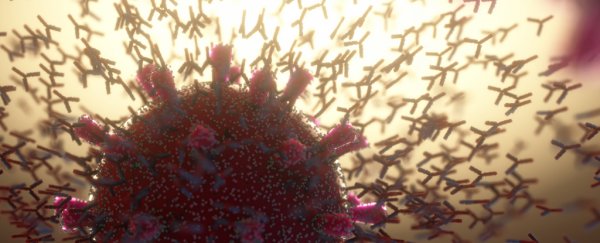Whether or not a person with COVID-19 develops severe disease depends a lot on how their immune system reacts to the coronavirus.
But scientists still don't know why some people develop severe disease while others suffer only mild symptoms – or no symptoms at all. Now, a new study from Yale University sheds some light on the issue.
The research, which has yet to be peer-reviewed and published in a journal, suggests that in patients with severe COVID, the body produces "autoantibodies". These are antibodies that – instead of attacking the invading virus – attack the patient's own immune system and organs.
The researchers found that people with severe COVID had autoantibodies that latched onto crucial proteins involved in recognising, alerting and clearing cells infected with the coronavirus.
These proteins include cytokines and chemokines – important messengers in the immune system. This interfered with the normal immune system function, blocking antiviral defences, potentially making the disease more severe.

Links with autoimmune disorders
For many years, autoantibodies have been known to be involved in autoimmune diseases, such as rheumatoid arthritis and lupus.
It is not known why some people develop these antibodies, but it is likely to be a combination of genetics and environment. Viral infections have also been linked to the onset of some autoimmune diseases.
Earlier this year, scientists reported that patients with no history of autoimmune disease developed autoantibodies after getting COVID. In these studies, the autoantibodies were found to recognise similar targets to those found in other well-known autoimmune diseases, such as proteins normally found in the nucleus of cells.
Later studies discovered that people with severe COVID can also develop autoantibodies to interferons, immune proteins that play a major role in fighting viral infections.
The Yale scientists who carried out the latest study, used a new technique that screened for autoantibodies that work against thousands of the body's proteins. They searched for autoantibodies in 170 hospitalised patients and compared them with autoantibodies found in people who suffered mild illness or asymptomatic infection, as well as people who had not been infected with the virus.
In the blood of the hospitalised patients, they found autoantibodies that could attack interferons, as well as autoantibodies that could interfere with other critical cells of the immune system such as natural killer cells and T cells.
The findings showed that autoantibodies were a very common feature of severely ill COVID patients.
The Yale researchers conducted further tests in mice, which showed that the presence of these autoantibodies could make the disease worse, suggesting that these autoantibodies could contribute to the severity of COVID in humans.
Not the whole story
Though COVID patients had many autoantibodies that targeted immune system proteins, the researchers didn't find any COVID-specific autoantibodies that could be used to distinguish severely ill COVID patients.
What determines if a person is going to suffer from severe COVID depends on many things, and autoantibodies are not the whole story.
But the research suggests that people with existing autoantibodies may be at higher risk of getting severe COVID. These people may have deficiencies in their immune response during early coronavirus infection or be predisposed to making new autoantibodies that could hinder their immune response to the virus.
Researchers are increasingly focusing on the link between severe COVID and misdirected immune responses that target healthy tissues and proteins in the body. The presence of autoantibodies suggests that, for some patients, COVID could be an autoimmune disease triggered by the coronavirus.
Understanding what drives the production of autoantibodies will help scientists to develop new treatments for this disease.
Scientists don't know how long these autoantibodies last for after the infection has cleared. An important unanswered question is whether long-term damage caused by autoantibodies could explain some symptoms of long COVID.![]()
Rebecca Aicheler, Senior Lecturer in Immunology, Cardiff Metropolitan University.
This article is republished from The Conversation under a Creative Commons license. Read the original article.
